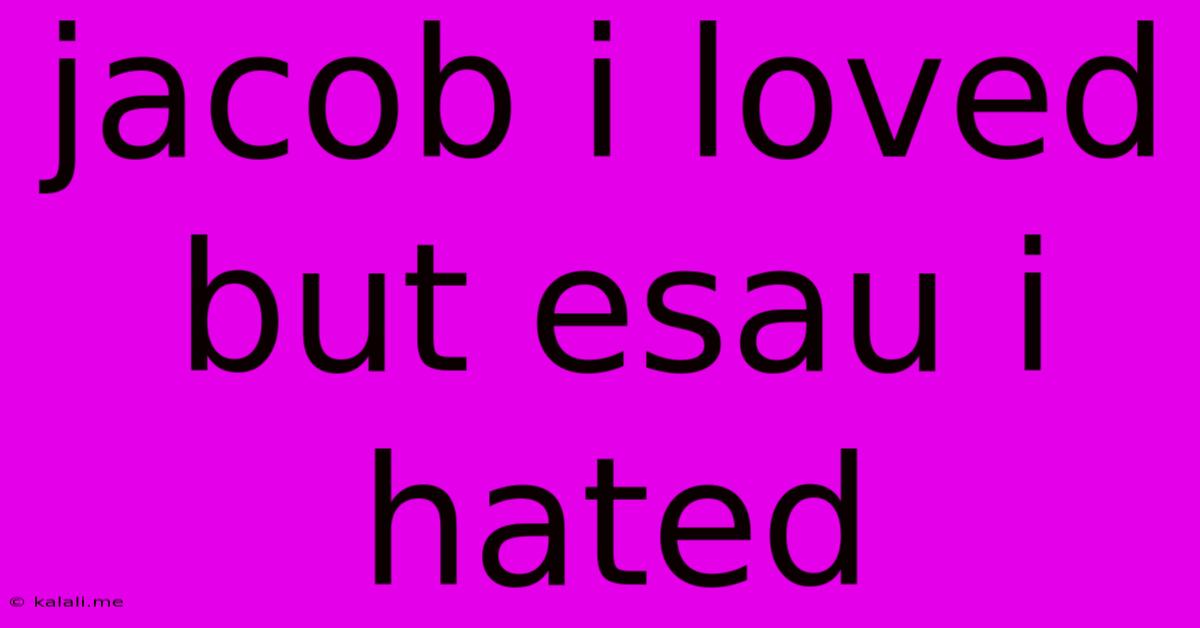Jacob I Loved But Esau I Hated
Kalali
Jun 08, 2025 · 3 min read

Table of Contents
Jacob I Loved, But Esau I Hated: Exploring God's Mysterious Favoritism
This phrase, "Jacob I loved, but Esau I hated," from Malachi 1:2-3, has puzzled and provoked theological debate for centuries. It's a verse that seemingly contradicts God's image of universal love and justice. This article will delve into the complexities of this statement, exploring its context, interpretations, and implications for our understanding of God's relationship with humanity. Understanding this passage requires careful consideration of the Old Testament narrative and the broader themes of divine election and covenant.
Understanding the Context: Malachi and the Nation of Israel
Malachi's prophecy was delivered to a disillusioned and spiritually apathetic Israel. The nation was struggling with ritualistic hypocrisy and a declining commitment to God's covenant. The prophet's words are not a statement of arbitrary preference but a reflection on the historical relationship between God and the twin brothers, Jacob and Esau, as a powerful metaphor for Israel's relationship with God. This isn't about individual favoritism but rather a broader commentary on God's choice of a nation and the consequences of rejecting His covenant.
The Jacob and Esau Narrative: A Foundation for Understanding
The story of Jacob and Esau, found in Genesis 25-35, provides the essential background. While the twins were born with strikingly different personalities – Esau, the outdoorsman, and Jacob, the schemer – it was not a simple matter of personal preference. Esau's casual disregard for his birthright, selling it for a bowl of stew, symbolized a profound lack of commitment to the covenant promises God had made to Abraham. Jacob, though flawed, demonstrated a stronger, albeit often manipulative, desire to receive the blessing and inherit the covenant.
Divine Election: A Key Theological Concept
The concept of divine election, the choosing of individuals or groups by God for a specific purpose, is central to understanding Malachi's words. God's choice wasn't based on merit but on His sovereign will. This doesn't negate free will; rather, it highlights God's initiative in establishing His covenant relationship. The choice of Jacob, and subsequently the nation of Israel, signifies God's commitment to His plan of redemption, even amidst human flaws and failures.
“Loved” and “Hated”: A Nuance in Translation and Interpretation
The Hebrew words translated as "loved" and "hated" are not necessarily equivalent to our modern understanding. The term for "loved" implies favour, election, and covenant relationship; the term for "hated" suggests rejection and the consequences of rejecting the covenant. Therefore, the verse should not be interpreted as expressing personal affection or animosity. It's a declaration of God's chosen relationship with Jacob and the resulting consequences for Esau.
Implications and Applications for Today
The message of Malachi 1:2-3 remains relevant today. It serves as a reminder that:
- God's choice is not based on human merit: We are chosen by grace, not by works.
- Covenant faithfulness is essential: Our relationship with God depends on our commitment to His promises.
- Consequences exist for rejecting God's grace: There are spiritual implications when we turn away from God's plan for our lives.
Conclusion: A Deeper Understanding of Divine Sovereignty
The phrase, "Jacob I loved, but Esau I hated," is not a simple declaration of arbitrary favouritism. It's a complex theological statement highlighting God's sovereignty, His covenant relationship with Israel, and the importance of faithful commitment to His plan. By understanding the historical context and the nuances of the Hebrew language, we can appreciate the depth and significance of this challenging passage, ultimately enriching our understanding of God's character and His relationship with humanity. This passage reminds us that God's actions, while sometimes mysterious, are always rooted in His unwavering plan of redemption.
Latest Posts
Latest Posts
-
Names That Are The Same In Spanish And Japanese
Jun 08, 2025
-
Is Work A Scalar Or Vector
Jun 08, 2025
-
The Rain Gives You Permission To Slow Down
Jun 08, 2025
-
Can You Attend Traffic School After Ticket Is Paid
Jun 08, 2025
-
What Is The Perfect Bpm Rate For A Musician
Jun 08, 2025
Related Post
Thank you for visiting our website which covers about Jacob I Loved But Esau I Hated . We hope the information provided has been useful to you. Feel free to contact us if you have any questions or need further assistance. See you next time and don't miss to bookmark.